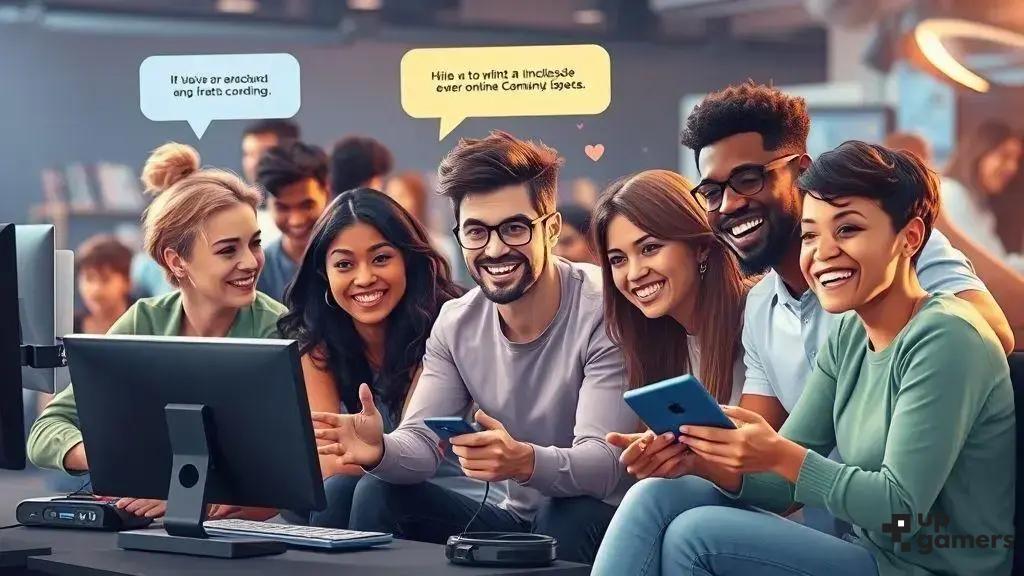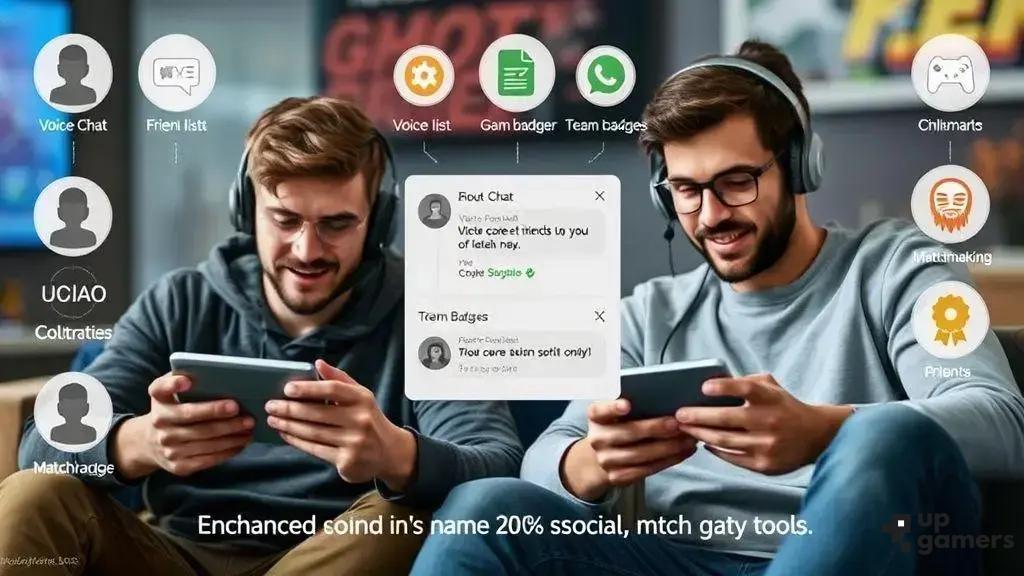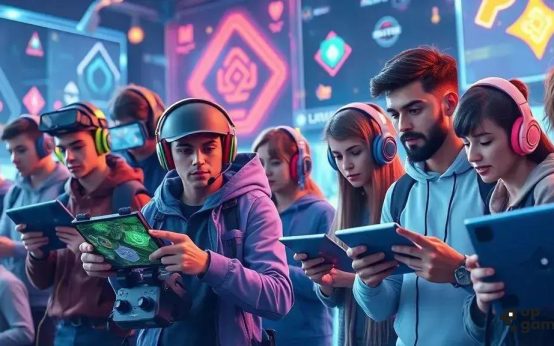How social gaming strengthens online communities by enabling meaningful interactions, fostering supportive groups, enhancing real-world connections, and utilizing tools like voice chat and matchmaking to create inclusive, engaging, and lasting player networks.
How social gaming strengthens online communities might surprise you. It’s not just about playing; it’s about connecting, sharing moments, and sometimes building friendships that last beyond the screen.
the role of social gaming in building connections
Social gaming plays a crucial role in building connections among players worldwide. Unlike traditional gaming, social games emphasize interaction, collaboration, and communication, allowing players to form bonds beyond just competition. Features such as chat functions, friend lists, and cooperative challenges encourage users to engage socially and stay connected.
Many players find communities within games where they share common interests and hobbies. These virtual spaces offer support networks that can reduce feelings of isolation, especially for individuals who might struggle with face-to-face social interactions. In-game events and team-based gameplay encourage players to work together, creating shared experiences that deepen relationships.
Furthermore, social gaming often transcends the digital world. Players build friendships that extend to other platforms, including social media and video calls. This blending of online and offline connections highlights how gaming can be a powerful tool for socialization in today’s digital age.
Some games even implement systems to match players based on interests or play styles, increasing the chance of meaningful connections. The ease of access and the welcoming nature of many social gaming communities invite people from all walks of life to participate and build relationships.
In summary, social gaming creates spaces where interaction is encouraged and relationships can flourish naturally through shared activities and communication, making it a valuable platform for connection building.
ways social gaming creates supportive online spaces

Social gaming creates supportive online spaces by fostering environments where players feel valued and safe. Many games include features like guilds, clans, or teams, which encourage cooperation and create a sense of belonging. These groups often have their own rules and cultures that promote respect and positive interaction.
In addition, social gaming platforms usually offer moderation tools and reporting systems to manage toxic behavior. This helps maintain a positive atmosphere where players can connect without fear of harassment. Community managers and moderators actively support healthy communication, resolving conflicts and encouraging kindness.
Games often host events and challenges that require teamwork, which strengthens bonds among players. These activities promote collaboration and mutual support, making the gaming experience more enjoyable and rewarding.
Moreover, many social games include communication options like voice chat and messaging, allowing players to share tips, celebrate achievements, or simply chat. This ongoing interaction contributes to long-lasting friendships and a reliable support network.
Ultimately, social gaming transforms online spaces into welcoming communities where players uplift one another, share common goals, and build trust. This is essential for creating a positive gaming culture that attracts and retains players.
impact of social gaming on real-world relationships
Social gaming has a significant impact on real-world relationships, often bridging the gap between online interactions and face-to-face connections. Many players use games as a way to stay in touch with friends and family, especially when physical distance separates them. This shared activity offers a common ground to maintain and strengthen bonds.
Beyond maintaining existing relationships, social gaming can lead to the formation of new friendships. Players often meet people with similar interests, which sometimes evolve into real-life meetups or long-lasting connections. These relationships can enrich personal lives by providing support, companionship, and shared experiences.
Teamwork and cooperation in social games teach valuable skills such as communication, empathy, and conflict resolution, which can positively affect players’ behavior outside of gaming contexts. These skills often translate into better social interactions and stronger relationships in everyday life.
Moreover, social gaming has become a popular way for couples and families to bond. Playing together promotes fun, laughter, and collaboration, which can improve emotional ties. It offers an opportunity to create memories and experience challenges as a team.
While concerns exist about excessive gaming affecting personal lives, many studies show that balanced gaming can enhance social skills and relationships. The key is using social gaming as a positive tool to connect rather than isolate.
tools and features that enhance social gameplay

Various tools and features significantly enhance social gameplay by making interaction easier and more engaging. Voice chat and text messaging systems allow players to communicate instantly, plan strategies, and share experiences, which builds stronger connections during gameplay.
Friends lists and friend invitations help players stay connected and build networks within games. These features encourage return visits and long-term engagement by reminding players to join others in ongoing play sessions.
Matchmaking systems help pair players with similar interests, skill levels, or play styles, ensuring that social interaction is enjoyable and balanced. This increases satisfaction and encourages cooperative play instead of frustration.
Many games include clans, guilds, or teams, which serve as micro-communities where players can coordinate, compete, and socialize. These groups often have dedicated communication channels and shared goals, deepening the sense of camaraderie.
In-game events and challenges designed for groups motivate players to collaborate and celebrate victories together. These features turn gaming sessions into shared experiences that can create lasting memories and stronger bonds.
future trends in social gaming and communities
The future of social gaming is shaped by emerging technologies and evolving player expectations. Virtual reality (VR) and augmented reality (AR) are poised to transform social interactions by creating immersive environments where players feel truly present with friends and communities. These technologies will make games more interactive and lifelike.
Cloud gaming is another trend increasing accessibility by allowing players to join games without powerful hardware. This expands social gaming’s reach, connecting more diverse communities worldwide.
Cross-platform play continues to grow, enabling players on different devices to play and socialize together seamlessly. This breaks down barriers and builds larger, more inclusive gaming communities.
Artificial intelligence (AI) is expected to play a bigger role in social gaming by personalizing experiences, matchmaking players with similar interests, and moderating chat to maintain positive environments. AI-driven features will enhance social interactions and reduce toxic behavior.
Additionally, the rise of decentralized platforms using blockchain technology may empower players with ownership of in-game assets and help build trust within communities. These trends point to a future where social gaming is more immersive, inclusive, and player-driven.
how social gaming strengthens online communities
Social gaming offers more than just fun; it builds meaningful connections and supportive spaces for players worldwide. By encouraging teamwork, communication, and shared experiences, it helps people form bonds that often extend beyond the virtual world.
With tools like voice chat, matchmaking, and community features, social games create environments where players feel welcome and valued. Emerging trends like virtual reality and AI promise to make these experiences even richer and more inclusive.
Whether you’re looking to stay connected with friends or meet new people, social gaming can play a positive role in enhancing real-world relationships and fostering strong online communities.
FAQ – How social gaming strengthens online communities
What is social gaming and how does it build connections?
Social gaming involves playing games that emphasize interaction and cooperation, helping players form friendships through shared experiences and communication.
How do social games create supportive online spaces?
They use features like clans, guilds, moderation tools, and events that encourage teamwork, respect, and positive interactions among players.
Can social gaming improve real-world relationships?
Yes, social gaming can maintain and deepen real-life friendships and family bonds by providing fun, shared activities even when physically apart.
What tools enhance social gameplay?
Voice chat, text messaging, matchmaking systems, and group features like teams or clans help players connect and collaborate effectively.
What future trends will impact social gaming communities?
Technologies like virtual reality, augmented reality, cloud gaming, AI, and blockchain will make social gaming more immersive, accessible, and inclusive.
Is social gaming suitable for all ages and backgrounds?
Yes, many social games are designed to be inclusive, welcoming diverse players and creating safe spaces through moderation and community support.




